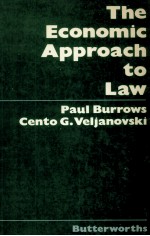
- 作 者:PAUL BURROWS
- 出 版 社:
- 出版年份:1981
- ISBN:
- 标注页数:343 页
- PDF页数:352 页
请阅读订购服务说明与试读!
订购服务说明
1、本站所有的书默认都是PDF格式,该格式图书只能阅读和打印,不能再次编辑。
2、除分上下册或者多册的情况下,一般PDF页数一定要大于标注页数才建议下单购买。【本资源352 ≥343页】
图书下载及付费说明
1、所有的电子图书为PDF格式,支持电脑、手机、平板等各类电子设备阅读;可以任意拷贝文件到不同的阅读设备里进行阅读。
2、电子图书在提交订单后一般半小时内处理完成,最晚48小时内处理完成。(非工作日购买会延迟)
3、所有的电子图书都是原书直接扫描方式制作而成。
1 Introduction: the economic approach to law&Paul Burrows and Cento G. Veljanovski 1
1.1 The economic approach to law 2
1.2 The benefits and costs of the economic approach 13
1.3 Positive economic theories of law—prediction v description 17
1.4 Toward an economic approach of the third kind 22
1.5 Statutory control 25
1.6 Concluding remarks 25
Part one Contract 35
2 Contract analysis: the transaction cost approach&Oliver E. Williamson 39
2.1 Economic approaches to contracting 39
2.2 A three-way classification of contracts 42
2.3 Transaction cost economics 45
2.4 Commercial contracting 48
2.5 Other applications 55
2.6 Concluding remarks 56
3 Economic analysis of contractual relations&Ian R. Macneil 61
3.1 Neoclassical microeconomic model, transactions costs and relational contract 62
3.2 Discrete transactions and modern contractual relations 64
3.3 Neoclassical microeconomic analysis of contractual relations 75
3.4 Conclusion 85
4 Judicial control of standard form contracts&M.J. Trebilcock and D.N. Dewees 93
4.1 Introduction 93
4.2 Standard form contracts and monopoly 98
4.3 Standard form contracts and information asymmetries 104
4.4 Comparative institutional competence 116
Part two Tort 121
5 The economic theory of tort liability—toward a corrective justice approach&Cento G. Veljanovski 125
5.1 Introduction 125
5.2 The legal and economic objectives of tort liability 126
5.3 A corrective justice framework 133
5.4 Some applications 140
5.5 Conclusion 144
6 Nuisance, legal rules and decentralized decisions: a different view of the cathedral crypt&Paul Burrows 151
6.1 Introduction 151
6.2 Justice and efficiency defined 151
6.3 Tertiary costs, information and general deterrence 152
6.4 Criteria for selecting legal rules 154
6.5 Conclusion 163
7 Negligent misrepresentation: an economic reformulation&William Bishop 167
7.1 Introduction 167
7.2 Conventional debate 168
7.3 Information production and appropriability 170
7.4 Two party negligent misrepresentation: transaction costs and quality signalling 176
7.5 Three party negligent misrepresentation 180
7.6 Public authorities 183
7.7 Conclusion 184
Part three The judicial process 187
8 Economic aspects of legal procedure&Roger A. Bowles 191
8.1 Introduction 191
8.2 Analytical background 192
8.3 Procedural issues 197
8.4 Concluding remarks 207
9 Quantitative rules and judicial decision making&Anthony I. Ogus 210
9.1 Optimal precision of legal rules 210
9.2 Trends in judicial rulemaking 215
9.3 Conclusions 222
10 The plea bargain in England and America: a comparative institutional view&Richard P. Adelstein 226
10.1 Criminal price exaction and the development of procedure 226
10.2 The negotiated plea in the price exaction framework 229
10.3 External aspects of the price exaction procedure: moral cost considerations 237
10.4 A direction for further research 246
11 Judicial responses to exchange rate instability&Roger A. Bowles and Christopher J. Whelan 253
11.1 Introduction 253
11.2 The law before 1975 254
11.3 The law since 1975 256
11.4 Some difficulties 259
11.5 Behaviour of defendants 265
11.6 Conclusions 267
Part four Public law 273
12 Landlord-tenant relations law&Werner Z. Hirsch 277
12.1 Introduction 277
12.2 Habitability laws 278
12.3 Rent control laws 290
12.4 Just-cause eviction laws 295
12.5 Age discrimination laws 298
12.6 Conclusions 300
13 The law and economics of the misconduct rule of unemployment insurance&Paul T. Fenn 307
13.1 Introduction 307
13.2 The misconduct rule: objectives and interpretation 308
13.3 Dismissal for misconduct: optimizing behaviour where the law is given 312
13.4 Disqualification for unemployment benefit as a result of misconduct: some evidence 315
13.5 Conclusion 318
14 Tax avoidance&J. Feldman and J. A. Kay 320
14.1 Introduction 320
14.2 Origins of tax avoidance 321
14.3 Tax avoidance and the definition of income 323
14.4 Tax avoidance in practice 325
14.5 Is tax avoidance inevitable? 331
Index 334
